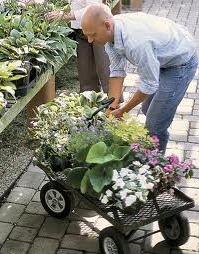





When the first wildlife gardens were suggested in the 1970s, it was extremely difficult to buy plants or even seeds of wild flowers. As the whole subject of wildlife and conservation has grown, however, so the nurseries have followed, and it is now much easier to obtain both plants and seeds of many native plants. Some wildflowers have become so popular that garden centres carry a range of wildflower seeds, including ready-made mixtures.
 If you are really interested in conserving native plants then it is important to check the provenance of the seed you buy, that is, the place from which it originates. Some of the commercial seed available may have been collected in another country and is, therefore, not a true native of your area. It may even show some differences, possibly having brighter flowers or larger leaves. Look for local seed and try to buy only from one of the nurseries specializing in wild flowers who are usually meticulous as to where their seeds are collected.
If you are really interested in conserving native plants then it is important to check the provenance of the seed you buy, that is, the place from which it originates. Some of the commercial seed available may have been collected in another country and is, therefore, not a true native of your area. It may even show some differences, possibly having brighter flowers or larger leaves. Look for local seed and try to buy only from one of the nurseries specializing in wild flowers who are usually meticulous as to where their seeds are collected.
It is possible to collect seed from plants growing in the wild but this must be done sparingly and only of common species that are not on the endangered plant list. Ask permission from the landowner first and take only enough seed for your own use. Once you have started growing wild flowers it should be possible and much easier to harvest your own seed each year for future use.
Hints and Tips
Never take fully grown plants or collect seeds from the wild unless you know what you are doing is legal and you have the land-owner’s permission to do it.
Seek advice from specialist nurseries or garden centres regarding the best way to obtain the plants you wish to grow. Be careful not to plant species that will take over not only your own garden but also your neighbours’. When plants are established, collect your own seeds.
Many native plants are available from specialist nurseries and some can be bought from garden centres. The nurseries may supply a range of size of plants, depending on the species and type of plant.
Many herbaceous perennials are available as trays of ‘plugs’ — small rooted plants ready to be planted out in a wildflower meadow or woodland garden. These are relatively inexpensive and very useful when establishing large numbers of individual species. Where only a few plants are needed, perhaps for a clump in the flower border, then small pots of plants may be a simpler and better alternative.
Hedging plants are usually planted as bare-root seedlings or transplants. Seedlings are a single rooted stem 30-60cm (12-24in) high, whereas transplants have stronger root systems and the stem or stems are 45-90cm (18-36in) high. Larger plants can be used but the transplants have the highest success rate and are relatively inexpensive.
Many native shrubs are used in hedging, and it is possible to buy hedging-sized plants for general planting. However, where plants are to be planted individually larger plants may be better. Shrubs that are sold in containers have compost around their root balls and are often much easier to establish than bare-root plants.
Native trees are usually grown from seed and are available as seedlings and transplants. Most trees, particularly oak and beech, thrive most successfully if planted as small specimens of about 1.8m (6ft) high.
COLLECTING NATIVE PLANTS FROM THE WILD
It is against the law to dig up plants in the wild without first asking permission of the owner of the land. There is also a list of protected species that it is illegal to pick, dig up, damage or sell. There are also certain areas of high nature conservation interest, including nature reserves, and areas of special scientific interest in which all plants are protected by law. If you cannot find a plant in a nursery and know that there is a plentiful supply locally, then seek the advice of your local nature conservation trust or botanical society and the land-owner’s permission. It is more prudent to start plants from seed or to purchase plants from a specialist nursery.
Copyright © www.100flowers.win Botanic Garden All Rights Reserved